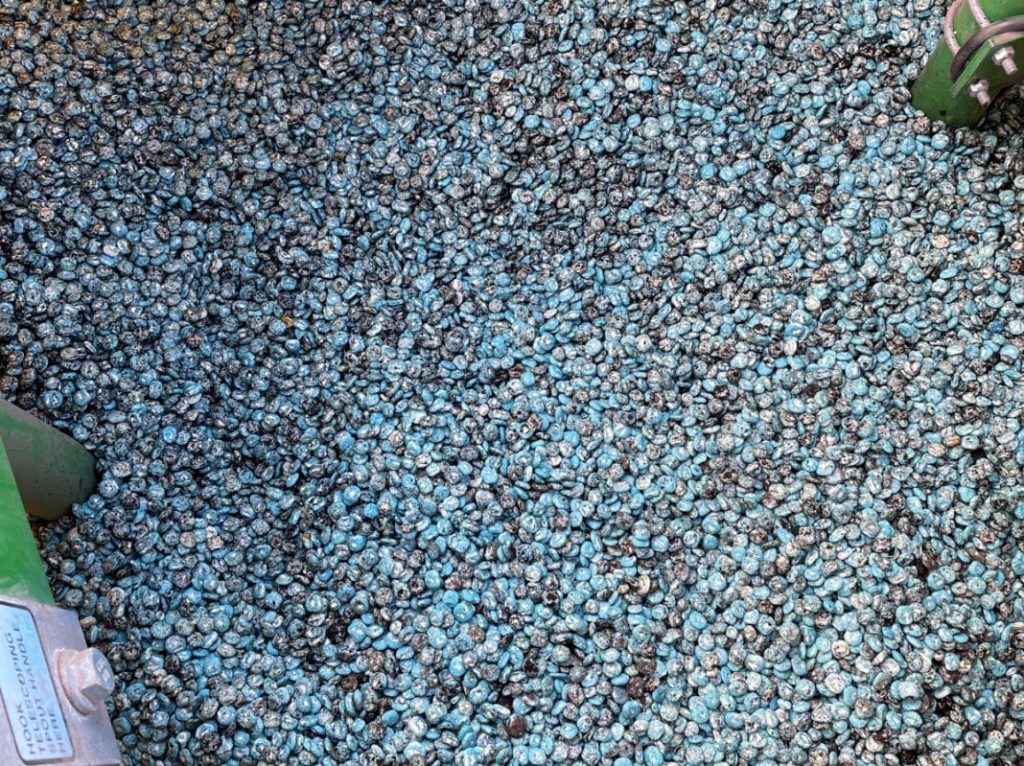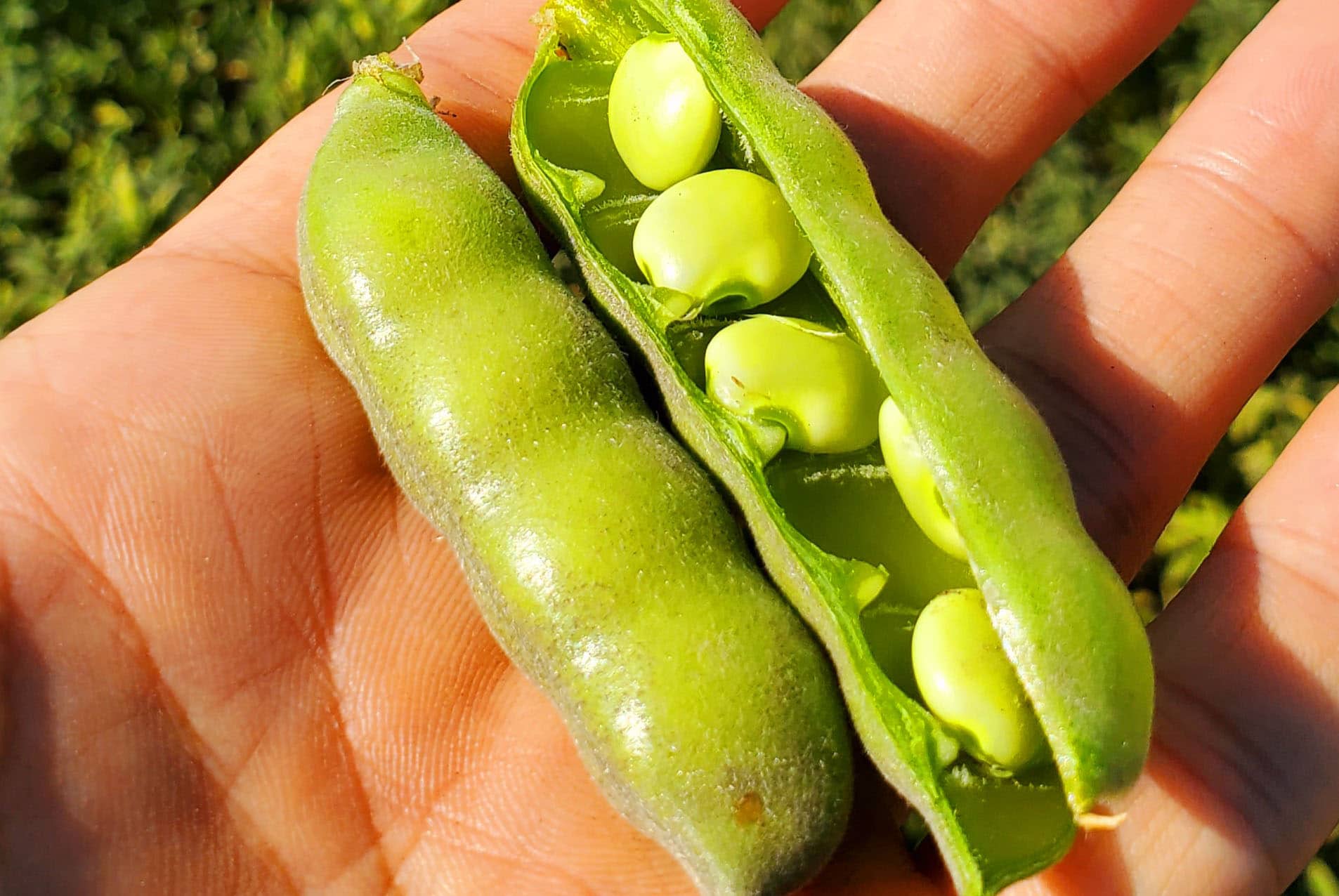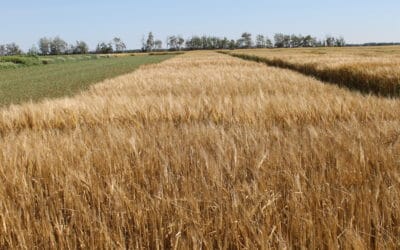Lupin bean pods. Photo: Koralta
The following piece is from our sister publication, Germination.
According to a new Ernst & Young report commissioned by supercluster funding agency Protein Industries Canada (PIC), the global plant-based food, feed and ingredients market will likely surpass $250 billion by 2035.
Yellow peas, soybeans, canola and hemp are all in hot demand, and because of its many attributes, the lupin bean is now entering the spotlight as well.
“Lupin is an attractive crop because it produces comparable yields to peas, and lupin protein is 35 to 40 per cent compared to an average of 24 per cent for peas,” says Tristan Choi, director at Koralta Agri-Business — a company leading the development of the crop in Canada.
“In addition, independent research finds that our lupin varieties are resistant to the latest pulse disease like aphanomyces root rot, which dramatically reduces yield in some other pulse crops.”
Like other pulses, lupin also fixes nitrogen when properly inoculated. Intensive breeding programs have ensured modern lupin varieties have relatively low levels of the alkaloids found in ancestral genotypes.
Koralta has acquired Canadian registration for two European varieties. One is a white lupin (L. albus) called Dieta, the other a blue variety (L. angustifolius) called Boregine. Choi explains Dieta is a well-established food grade variety and Boregine has been perceived as only feed grade, but that perception is changing.
The oldest lupin seeds have been found in the tombs of Ancient Egyptian Pharaohs. Lupin seeds are still a very popular snack in Egypt. The Ancient Romans spread the crop throughout the empire. Lupin seeds were also a common food widespread during the Incan Empire and were also eaten by Native Americans.

Today, lupin seeds are traditionally eaten as a pickled snack food, primarily in the Mediterranean area, Latin America and North Africa. Lupin bean flour is widely used in parts of Europe and in Australia as an additive to wheat flour, enhancing flavour and lending a rich, creamy colour to the resulting foods.
In 2020, only four per cent of lupins were consumed by humans, with the majority used as stock feed.
The Canadian business for Dieta will initially focus on food uses with some feed uses in Middle East markets and production will take place in Manitoba due to its longer growing season and proximity to initial customers in the Canadian and U.S. food industries. Boregine has undergone testing by Alberta Agriculture for several years and is well-adapted to the parkland areas of Alberta. The primary market for Boregine will be feed markets in Asia where Koralta has already secured a substantial blue lupin crop market.
Koralta is aiming for about 40,000 acres of total production in Western Canada by 2023 of both varieties. This year, it has contracted some seed production and a small amount of commercial production. In Manitoba right now, Red River Seeds and J.S. Henry and Son Ltd. are multiplying Dieta, and in Alberta, Galloway Seeds, Lindholm Seed Farm and Brian Ellis Seed are doing the same for Boregine.
Koralta is also partnering with Hensall Co-op in Ontario and two farmers to investigate agronomic/economic fit for Dieta.
Gordon Butcher, CEO Of AgCall (a firm which has been contracted by Koralta to assist with research and commercialization of lupin in Canada) notes that acreage is initially being limited to black soil zones because the crop needs moisture to produce competitive yields to pea. Lupin also must be grown on lower pH soils (blue less than 7.3 and white less than 7.8) as soil acidity levels can affect protein and yields.
J.S. Henry and Son Ltd in Oak River, Man., is contracted to grow 140 acres this year.
“Our seed stock came from the UK, and they also grow lupins with great success in Australia, two very different areas of the world for growing crops, so we’ll see what happens here,” says co-owner Eric McLean, who also co-owns BenLedi Farm and is vice-president of Seeds Canada.
“Similarly to what happened when soybeans were introduced in Western Canada, there will be three to five years of determining yield and production parameters.”
The Years Ahead for Lupin Bean
Koralta has established a closed loop production system with all parties. Each commercial grower must sign a purchase agreement with Koralta to deliver all grain production to Koralta prior to the seed growers selling and supplying seed.
Grain production will grow each year, expected to reach 50,000 acres by 2024 and potentially 100,000 acres by 2028. “We haven’t finalized pricing, but we expect prices to be at a premium to peas in both the feed and food markets,” says Choi. “Prices are primarily driven by the value of incremental protein and the expectation that Canada can deliver a superior product compared to other lupin sources.”
McLean notes if a large amount of lupin acreage is ever going to be achieved, farmers will also need crop insurance and more crop protection product options. There are only a few post-emergent broadleaf herbicides registered at this time, so McLean and the other contract growers have to stick with the limited basic chemistries for broadleaf weed control.
AgCall will continue with extensive research on this front. “Post-emergent broadleaf weed control is still a challenge and more research is being undertaken to register new herbicides since some existing pea herbicides can cause injury,” Choi explains. “We also anticipate having a liquid inoculant available to replace the existing peat-based powder inoculant that is presently registered in Canada for lupin.”
Choi and his team are excited about developing the entire value chain for lupin — from variety development to seed and grain production to the development of value-added processing technologies and end-use markets here in Canada and abroad.
“For now, we are excited about working with these five seed growers,” he says, “and look forward to growing this new pulse crop into an established high-quality protein source, with Canada the supplier of choice for the highest-quality lupin available worldwide.”
Related Articles
Plant Protein Alliance of Alberta Shuts Down After Funding Pulled
Plant Protein Alliance of Alberta Striving for a Paradigm Shift in Alberta Agriculture





